Haslington Plasterers: Whether you have a small plastering task or a sizeable plastering project to be done on your home in Haslington, you will need a qualified and professional plasterer to tackle the work in a proper and correct manner. It is not advisable to attempt plastering yourself, since it is a craft that takes many years to master.
Even modest home restoration projects could call for some plastering work to be done. It might be things like installing cornices or coving before decorating, skimming a dry lined partition, applying some screeding or plastering over an old artexed ceiling. Don't however imagine that those are the only plastering, screeding and rendering jobs that might be necessary, as there are many more possibilities.
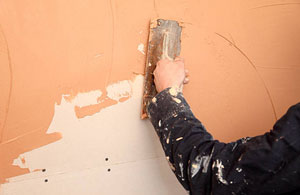
Ask if you can see a few photos of earlier accomplished projects when talking to potential Haslington plasterers, anybody who really know their stuff will be glad to do this, and have nothing to hide. You obviously want to avoid employing a "cowboy" for this type of project. Significant complications can result from inferior plastering, as you'll soon realise.
Once a coat or two of paint goes onto a freshly plastered wall or ceiling, you will soon become aware of any defects. They will probably look even worse with the sun shining on them. To avoid problems like this, choose only from competent plasterers in Haslington.
Being merely a base onto which other materials are subsequently applied, means that plastered surfaces must be smooth and level above everything else. It's quite easy to fill and repair any slight cracking and blemishes, however it's difficult to hide inherently uneven surfaces. Complications with the fitting of kitchen units, any area of tiling (kitchens or bathrooms), the decorating of ceilings and walls and the accurate fitting of architraves, can be caused by an imperfectly plastered surface.
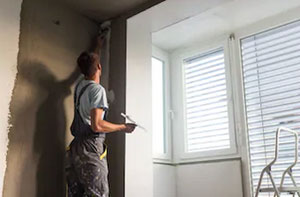
The aim of the most skillful Haslington plasterers is to get the perfect finish right from the trowel, and you should count on nothing less. A plastered ceiling or wall should never need to be sanded down to get a decent finish, it should only require a quick rub down with fine glasspaper prior to decorating. You'd be correct in thinking that the plastering hasn't been done to a satisfactory standard if extensive sanding is necessary. The alarm bells should certainly be ringing out if electric sanding machines are being utilized with any frequency.
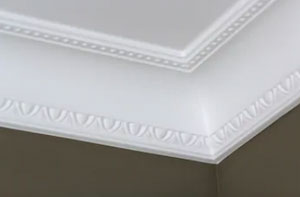
One of the most commonplace tasks for plasterers these days, is plastering over old artex ceilings. During the 1970's and 1980's, artex was the "in" finish for ceilings in Haslington, right now that is not the case. Most plasterers in Haslington will be more than happy to plaster over that artexed ceiling, to make it look more sleek and modern. On the reverse side, if you want to bring back that 70's style, most plasterers will just as gladly slap some artex on your currently smooth ceilings.
DIY Plastering Haslington: While it is usually much better to employ a reputable plasterer in Haslington when you have plastering work that should be undertaken in your home, it is quite possible to have a crack at plastering yourself if you're reasonably good at do-it-yourself, and have the self-belief to try. As a rookie plasterer it's a good idea to begin your plastering journey by perhaps practicing on a spare bedroom or an out of sight area, particularly one that already has a poor plastered finish and that cannot be made worse by your efforts. This is likely to be less stressful for you, and enable you to spend some time trying out your newly found skills. To a certain degree, it's possible for you to re-skim a wall as many times as you want, therefore if you make a lousy job of it to start with, you can just re-do it as your skills improve.

If you are searching for some tips and hints to to set you on your way, you might consider watching a few You Tube video tutorials. Or, if you are itching to learn plastering you might even consider signing up for a course at a nearby college. Plastering is a "hands on" process and the more you practice the more adroit you get. Sticking to the tried and tested ways is generally better when you are plastering, although through experimentation you could even come up with your own methods for getting that perfect finish. The more frequently you do it the more confident you will become, and when push comes to shove - plastering is mostly about self-confidence. Once you have perfected this art to a level you are satisfied with, you should be able to move on to plastering the main walls of your house. If you make a mess of it, you still have the option of bringing in a reputable Haslington plasterer to put it all right.
Screeders Haslington
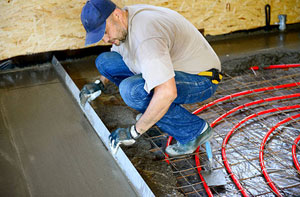
Screeding is a process through which a flat, smooth floor surface is established by the use of a cement mix. Screeding is normally applied on top of a concrete sub-floor to cover underfloor heating pipes, to be left as a wearing floor surface or to receive an appropriate floor finish (such as carpet, vinyl, tiles or wood). Enhanced durability, quality and finish is the result of a properly laid screed. A suitable screed pump should be employed to quickly ensure a smooth, even mix of cement and sand and to pump this perfect mix straight to its required location. The hand mixing of screed should only be used for smaller areas.
Re-Skimming Haslington
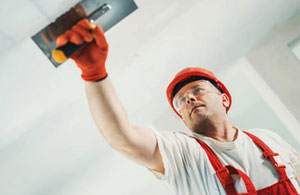
A thin covering of plaster trowelled on top of plasterboard, artex or damaged plasterwork is called skimming or re-skimming. Out of all the jobs that plasterers are asked to tackle, this is one of the most common. Plasterwork can easily be damaged during home renovations, or new dry lined walls might be added. Such imperfect surfaces can easily be transformed into glass-like and smooth finishes by a professional who is trained in this technique. After several days of drying, you'll be able to decorate over your new plastered area. You will end up with a totally flat and fault-free surface which will last for many years.(Tags: Plaster Skimming Haslington, Re-Skimming Haslington, Skimming Haslington)
Plasterboarding (Dry Lining)
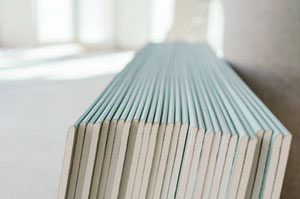
A number of plasterers in Haslington also offer dry lining services, which will be needed in a lot of improvement projects around the home. Dry lining is the process by which plasterboard is affixed to Gypframe metal framing, a brickwork surface or a timber studding or joist to produce a wall surface that doesn't have to be plastered. Although in a few cases the plasterboard itself may be decorated (with a little extra preparation), an exceptionally smooth, hard surface is generated by giving it one last skim of finishing plaster. In regards to fittings, when fixing plasterboard to wooden studding or joists, drywall screws or nails are used, when attaching to a brickwork wall "dot and dab" bonding compound is used and when fixing to a metal frame self-tapping (or Jack-Point screws) are used. (Tags: Plasterboarding Haslington, Dry Liners Haslington, Dry Lining Haslington)
Plastering Tools
Plasterers use a lot of tools that do not appear in the toolkits of other tradespeople or do-it-yourselfers, which is the main reason why the majority of plastering work in Haslington is most often done by specialist plasterers. Here are merely some of the tools that a Haslington plasterer will use on the job:
- Plasterer's Hawk
- Scarifier
- Plasterboard Carrier
- Feather Edge
- Plasterer's Trowel
- Plaster Pan & Buckets
- Edging Trowel
- Plaster Mixing Paddle
- Plastering Rule
- Finishing Trowel
- Jointing & Taping Knives
- Dry Lining Rasp
Plasterwork Patching Haslington
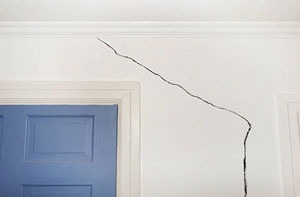
If you've recently had some building work done on your home in Haslington, or if you own an older Haslington property, you may have cracked or ruined plaster which needs patching. Plasterwork is vital for reasons of both strength and aesthetics, thus keeping it in great condition is a must. Cracked areas of plasterwork and parts that have been carelessly repaired with Polyfilla, look terrible and ruin the overall appearance your home. This sort of task is straightforward for any self-respecting Haslington plasterer, and your plastered walls should quickly be looking in perfect condition and ready to be decorated. Your plaster walls can be impacted by a number of different problems, with shrinking, accidental damage, damp, vibration and settlement being some of the more common causes. There's very little point patching these areas before resolving the underlying problems, or else there will probably be a reccurence of the issue.
Rendering
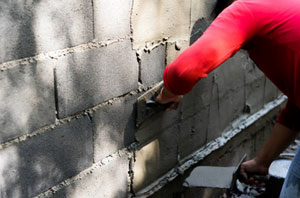
Rendering Haslington: Rendering is a similar procedure to plastering, and is the process where a mixture of sand, lime, cement and water is applied to external (and now and again interior) walls in order to achieve a textured or smooth surface finish. Rendering is especially common in the Mediterranean region, but is also a popular method across Southern Europe. A rendered finish is mainly used for cosmetic purposes but is also waterproof and has got some fire resistant properties. You can obtain a more resilient and long lasting result by colouring the render itself, even though it is of course possible to apply paint to a rendered surface.
Plastering Courses Haslington

Plastering Courses Haslington: The most effective way to either master the basic principles of plastering or to gain the required knowledge and skills to embark on a career in the plastering trade is to put your name down for an appropriate course at a training centre or college. For those eager to better their plastering expertise and for complete beginners, there are actually a range of plastering related courses on offer. Plastering courses are available for both City and Guilds or NVQ with choices for either intermediate tradesmen or complete novices. Beginners courses (level one) cover things such as putting on floating coats (to walls), installing sheet materials, putting on scratch coats (walls), putting on set coats, mixing up plaster materials and readying background surfaces. Advanced (Level Two courses) cover stuff like plastering to exterior backgrounds, fibrous plasterwork, dry lining/plasterboarding, sand and cement screeding and reverse moulds for fibrous plasterwork. Do a search on Yahoo or Google to uncover plastering courses in Haslington. You can learn about 5 day intensive plastering courses by clicking here.
Exactly What is Plaster?
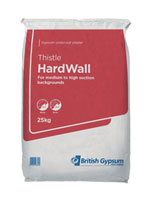
A frequently used material which is used for protecting and decorating wall and ceiling surfaces, plaster has been around for many centuries. In the UK the term "plaster" ordinarily pertains to a material that is applied to the insides of buildings, whilst the material used on exterior surfaces is known as "render". The plaster formula itself can include different ingredients but most commonly comprise of either gypsum, lime, or cement. All these mixes pretty much work in the same way, but are used for different things. A dry powder at the time of manufacture, when required plaster is mixed with water to make a stiff, easy to work paste. The reactions between the water and the plaster powder generates heat by way of crystallization and the mixture then sets and hardens.
Plasterer Haslington
A plasterer in Haslington is a professional tradesperson who exclusively with plaster, spreading a smooth, even coating of this prepared material over a previously rough and irregular surface. As a trade, plastering has been around for many hundreds of years, and as a technique in construction for possibly 1000's of years. In the world today, primarily applied to the interior walls and ceilings of residential and commercial buildings, plaster is used to produce an even and smooth surface that is ready to accept the final finishing material. Plaster can also be used to form ornate mouldings that can be used to embellish walls and ceilings. Playing a crucial role in several home building projects in Haslington, plastering is also used in the the construction of garages, attic conversions, extensions and porches.
Information

To join the world of plastering, rendering and screeding visit the Plasterer's Forum HERE. Subjects include Floor Screeding, Damp and Damp Proofing, Fibrous Plastering, Tips and Tricks of the Trade, Plasterer's Health and Wellbeing, General Trade Discussions, External Wall Insulation, Plastering Students Discussions, Magnetic Plaster and General Rendering. To read more regarding exterior plastering techniques, plasterer's tasks, plastering tools and materials, the history of plastering and plaster, traditional plasterer's techniques and interior plastering, take a look at the Wikipedia page (HERE). To identify a directory of accredited plasterers visit the Federation of Plastering and Drywall Contractors website. (Tags: Plasterers Haslington, Plasterers Cheshire, Plasterer Haslington, Plastering Haslington).
Plastering Tasks Haslington

Haslington plastering specialists will likely help with interior rendering and screeding Haslington, floor screeding and bull floating in Haslington, plaster patching, skirting board installation, damaged plaster renovation, the rendering of breeze blocks in Haslington, plaster removal, asbestos testing, skimming plaster walls, lay in grid suspended ceilings Haslington, monocouche rendering, lime plastering, relief plastering, blown plaster, dot and dab walling, pitted plastering, artexing preparation, floor levelling, artex patching, screeding driveways, ceiling overboarding, dry lining and plastering walls, stud partitions Haslington, rendering with sand and cement, ceiling crack repairs in Haslington, ceramic tiling Haslington, concrete plastering, dragged plastering, sand and cement screeds, ceiling replacements and other plastering work in Haslington, Cheshire.
Haslington Plastering Services
- Haslington Plaster Repairs
- Haslington Float and Set
- Haslington Rendering
- Haslington Plasterer
- Haslington Dry Lining
- Haslington Cornice Installation
- Haslington Plaster Skimming
- Haslington Ceiling Replacements
- Haslington Stud Partitioning
- Haslington Plaster Overskimming
- Haslington Polished Plastering
- Haslington Soundproofing
- Haslington Latex Screeding
- Haslington Plastering Estimates
Other Useful Trades in Haslington Cheshire

Needless to say, whenever you are doing home remodeling in Haslington, Cheshire, you'll probably need all kinds of different tradesmen and along with a plasterer in Haslington, Cheshire, you might also need polished plaster in Haslington, waste clearance in Haslington, plaster mouldings in Haslington, artex removal in Haslington, builders in Haslington, bricklaying in Haslington, dry liners in Haslington, electricians in Haslington, cornice fitters in Haslington, dry lining in Haslington, pebble dashers in Haslington, tiling in Haslington, external rendering in Haslington, wallpaperers in Haslington, screeding in Haslington, domestic cleaners in Haslington, carpenters & joiners in Haslington or external wall insulation in Haslington.
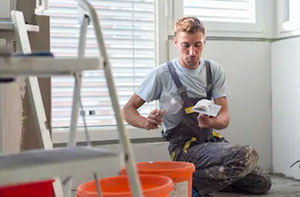 Plasterers Haslington
Plasterers Haslington Plastering Near Me
Plastering Near Me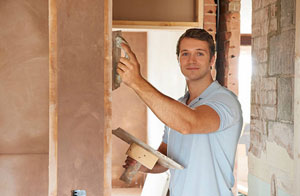 Plasterer Haslington
Plasterer HaslingtonPlastering Jobs Haslington: Browse plastering jobs in Haslington here: Plastering Jobs Haslington
More Cheshire plasterers: Great Sankey Plasterers, Knutsford Plasterers, Chester Plasterers, Runcorn Plasterers, Middlewich Plasterers, Sandbach Plasterers, Winsford Plasterers, Crewe Plasterers, Neston Plasterers, Alsager Plasterers, Macclesfield Plasterers, Congleton Plasterers, Ellesmere Port Plasterers, Wilmslow Plasterers, Warrington Plasterers, Northwich Plasterers and Widnes Plasterers.
Decorative Plastering Haslington - Polished Plaster Haslington - Artexing Haslington - Plasterer Haslington - Cheap Plasterer Haslington - Plastering Haslington - Rendering Haslington - Screeding Haslington - Plaster Skimming Haslington





